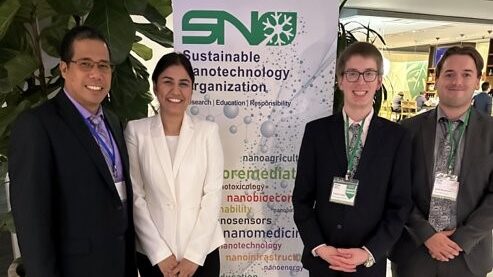Practicing sustainability involves more than just recycling your plastics. It also includes processes at microscopic levels.
Three Missouri State University chemistry and biochemistry students attended the 12th annual Sustainable Nanotechnology Organization (SNO) Conference in November to discuss innovations in sustainability on the nano-level and participate in some competitive presentations.
Held in Los Angeles, California, the conference provided a forum where scientists, engineers and other professionals exchanged information and ideas for the development and use of nanotechnology leading to overall sustainability.
“I admire my students for having the courage to compete,” said Dr. Cyren Rico, associate professor of chemistry and biochemistry at MSU. “It wasn’t easy to stand there and explain their work for such a short time. They worked and prepared hard. They are the only students from a non-research university to compete.”
Iqra Shakoor
A current chemistry master’s student, Shakoor gave a poster presentation on her research and participated in the NanoPitch competition.
It tasked participants with pitching a problem or opportunity connected with their sustainable nanotechnology research in a clear, compelling manner in 100 seconds or less.
For her research, Shakoor works on the application of nanoparticles to clean water of perfluorooctane sulfonic (PFOS) acid, a known toxic pollutant in the environment.
While she did not win the event, Shakoor did win the highly competitive SNO Student award. This, along with the great connections she formed, made the experience a great one.
“At SNO, I didn’t only get a chance to interact with senior researchers and professors, but I was also able to communicate with professors to know about their PhD positions, which I’m looking for,” she said.
Jake Churchman
Churchman is a chemistry major graduating in May 2024. At SNO, he gave a poster presentation on his research in Rico’s lab.
“My poster presentation discussed the pollutants PFOS and cerium oxide nanoparticles in plants to study the effects when they are present together,” Churchman said.
Churchman received the SNO Student grant in the amount of $375, which covered his registration fee.
He notes he has benefited from the conference and made many professional connections.
“SNO was an amazing experience to see the broad aspect to science and all the different fields of research and study being worked on and developed,” he said. “My favorite part was meeting and learning with people from so many different backgrounds of science and life. I made several connections with the speakers at the conference to hopefully connect and grow with in the future.”
Preston Clubb
A current chemistry master’s student with an emphasis on environmental chemistry, Clubb found the conference to be an enriching one. Along with Shakoor, he also participated in NanoPitch.
He gave an oral presentation titled, “Metabolomics reveals immense changes to daughter plants when exposed to PFOS acid when previously exposed to nano-ceria.”
“In short, this study investigated the effects of generational treatments of wheat with cerium oxide nanoparticles followed by exposure to PFOS,” he said. “The data seems to suggest that continuous exposures to contaminants could negatively affect the nutritional quality and grain elemental composition in succeeding generations.”
Clubb won first place in the NanoPitch, earning $300 and also received the SNO Student grant worth $375.
“I received great feedback from others on my presentation and our research,” he said. “I’m excited to incorporate their responses to improve upon the research even more,” Clubb said.
He not only won awards, but he also won some exciting opportunities for his future career.
“While I got to connect with colleagues and friends of mine as I have in years past, I had the opportunity to connect with new colleagues at our conference from UCLA and Carnegie Mellon. They gave me an offer to work at their institutions after graduation,” Clubb said. “I’m very excited to see what my future holds after I graduate in May 2024.”
Clubb has attended this conference in years past, and Rico recalls one of his colleagues noticing his growth.
“One of my colleagues noticed how Preston has grown in confidence in the last three years that he has been attending this conference,” Rico said. “I’m very proud of him.”
Rico’s presentation
Along with his students, Rico also presented at the conference. He discussed his lab’s research on generational exposure of plants to emerging contaminants.
“We have collected data on cerium oxide nanoparticles and PFOS using metabolomics and genomic methylations here at MSU and in my collaborations with outside researchers, like the U.S. Environmental Protection Agency and the University of California, Irvine,” he said.
In addition to his presentation, Rico reconnected with some colleagues and made new connections, opening new opportunities for collaboration.
“I had two meetings with two different research groups already, and our group is now getting ready to send samples to them for analysis.”
Explore opportunities in chemistry and biochemistry
Discover more from CNAS NewsWatch
Subscribe to get the latest posts sent to your email.




